|
|
|
Sort Order |
|
|
|
Items / Page
|
|
|
|
|
|
|
| Srl | Item |
| 1 |
ID:
073146
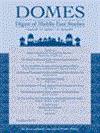

|
|
|
|
|
| Publication |
Hampshire, Ashgate, 2006.
|
| Description |
xvi, 234p.hbk
|
| Standard Number |
0754644812
|
|
|
|
|
|
|
|
|
|
|
|
Copies: C:1/I:0,R:0,Q:0
Circulation
| Accession# | Call# | Current Location | Status | Policy | Location |
| 051501 | 973.931/HUN 051501 | Main | On Shelf | General | |
|
|
|
|
| 2 |
ID:
132034
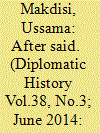

|
|
|
|
|
| Publication |
2014.
|
| Summary/Abstract |
The question of how to represent the U.S. role in the Middle East brings to the fore the question that Edward Said first raised in 1978 in Orientalism about the nature of American understandings of the Middle East. More than three decades after the publication of his book, Said's criticism of Orientalist scholarship-and his accompanying plea for a secular humanistic interpretation to replace it-remain both topical and enigmatic. It is one thing to criticize American representations of foreign cultures; it is an entirely different matter to study American engagements with them. These are by no means unrelated endeavors, but by the same token, they entail very different conceptions of what constitutes a field of inquiry and how to go about studying it comprehensively. The recent emergence of a more critical scholarship of America and the Middle East, therefore, begs the question of whether it is possible to write a history that takes both the Americans and Arabs equally seriously despite the prevailing political climate, and ultimately what kind of methodology this might entail for the rewriting of U.S.-Arab relations, and more broadly, American involvement in the world.
|
|
|
|
|
|
|
|
|
|
|
|
|
|
|
|
| 3 |
ID:
133305
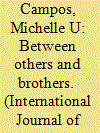

|
|
|
|
|
| Publication |
2014.
|
| Summary/Abstract |
Some fifteen years ago, the Israel Museum exhibition "To the East: Orientalism in the Arts in Israel" featured a photograph by the Israeli artist Meir Gal entitled "Nine Out of Four Hundred: The West and the Rest." At the center of the photograph was Gal, holding the nine pages that dealt with the history of Jews in the Middle East in a textbook of Jewish history used in Israel's education system. As Gal viscerally argued, "these books helped establish a consciousness that the history of the Jewish people took place in Eastern Europe and that Mizrahim have no history worthy of remembering." More damningly, he wrote that "the advent of Zionism and the establishment of the Israeli State drove a wedge between Mizrahim and their origins, and replaced their Jewish-Arab identity with a new Israeli identity based on European ideals as well as hatred of the Arab world."
|
|
|
|
|
|
|
|
|
|
|
|
|
|
|
|
| 4 |
ID:
155370
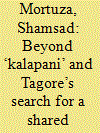

|
|
|
|
|
| Summary/Abstract |
In 1927, Rabindranath Tagore wrote a series of letters during his ‘pilgrimage’ to the countries of the Southeastern Rim of the Indian Ocean. He was convinced that India had forgotten its ‘gained’ territory that could be traced in some of the local customs and cultures. The presence of stories from the Puranas including The Ramayana and The Mahabharata led Tagore to believe in a larger imaginary Indianness outside its political realm. He held the imposition of ‘kalapani’ – the Hindu religious sanction against crossing the ocean – as a stumbling block that had eventually forced India to isolate itself. For him, without any concerted vision, it was impossible to attain true unity through ‘lip-union from public platforms’ [Tagore, R. (2010). Letters from Java (I. Chaudhurani and S. Roy, Trans., and S. Roy, Ed., p. 73). Kolkata: Visva-Bharati]. Recent scholarship has problematized the civilizing force of Indic values that Tagore expounded in his Letters from Java. However, Tagore’s call for consciousness building to rediscover and refine the common areas of Asian tradition and culture merits revisiting. Thus the paper purports to chart the cartography of the minds that once united different places and constituted a cultural capital as well as to survey the various metaphorical implications of ‘kalapani.’
|
|
|
|
|
|
|
|
|
|
|
|
|
|
|
|
| 5 |
ID:
168986
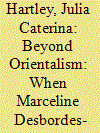

|
|
|
|
|
| Summary/Abstract |
This article follows a thread of translation and intertextual dialogue, taking us from the thirteenth-century Persian poet Saʿdi to the nineteenth-century French poet Marceline Desbordes-Valmore. It reads Desbordes-Valmore’s poem ‘Les roses de Saadi’ (1860) with the two passages from Saʿdi’s Golestān from which it was inspired, shedding new light on the poem’s metapoetic subtext. The original Persian text is compared to two French translations that were circulating at the time when Desbordes-Valmore was writing. This analysis of the Golestān’s reception forms the basis for the argument that Desbordes-Valmore recast in secular terms Saʿdi’s discourse on poetic language, emphasizing the continuity, rather than difference, between her concerns and Saʿdi’s. The case of Desbordes-Valmore thus reveals a forgotten facet of nineteenth-century French engagements with Middle Eastern culture: one of identification and literary influence, which existed alongside the processes of “othering” for which the period is better known.
|
|
|
|
|
|
|
|
|
|
|
|
|
|
|
|
| 6 |
ID:
092915
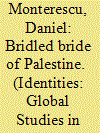

|
|
|
|
|
| Publication |
2009.
|
| Summary/Abstract |
Through ethnographic and archival research centered in Jaffa, this article analyzes how the image of the Jewish-Arab mixed city has been represented and (re)produced in the Zionist historical imagination since the establishment of the state of Israel to the present. Vacillating between romantic historicity and political violence, the image of Jaffa poses a political and hermeneutic challenge to the territorial project of urban Judaization, which ultimately failed to define and establish the national-cum-cultural identity of this "New-Old" city. This failure, I argue, results in a persistent pattern of semiotic ambivalence which, from the Jewish-Israeli point of view, positions Jaffa both as a source of identity and longing (in the distant past) as well as a symbol of alterity and enmity (in the recent past)- an object of desire and fear alike. As such, Jaffa and other ethnically mixed towns (including Ramle, Lydda, Haifa, and Acre) occupy a problematic place in Israeli and Palestinian political and cultural imagination. A bi-national borderland in which Arabs and Jews live de facto together, these cities bring to the fore, on the one hand, the paradox of Palestinian citizens in a fundamentally Jewish state, while simultaneously suggesting, by the very spatial and social realization of "mixed-ness," the potential imaginary of its solution. Unfolding through four distinct historical modalities of urban Orientalism, this article historicizes the highly politicized image of the Jewish-Arab city and the discourse on its future. These discursive formations reconfigured the public space that enabled, paradoxically since the October 2000 events, new political claims for equal citizenship, bi-national cooperation, and Palestinian presence.
|
|
|
|
|
|
|
|
|
|
|
|
|
|
|
|
| 7 |
ID:
138943
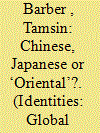

|
|
|
|
|
| Summary/Abstract |
The young British-born Vietnamese are a relatively invisible group in ‘super-diverse’ London who are often misidentified in their everyday encounters. Eluding more straightforward processes of ethnic or racial assignment, the young Vietnamese ‘pass’ in various different ways as Chinese, Japanese, Korean, Thai or ‘Oriental’. Drawing upon primary interview data and participant observation, this article traces ‘passive’ and ‘deliberate’ forms of passing to highlight how intersecting processes of class, gender and place enable/engender different kinds of passing. It is argued that Vietnamese-passing challenges more ‘celebratory’ readings of (super-) diversity by concealing (and depoliticising) difference and erasing Vietnamese voices rather than allowing for their proliferation. It is suggested that practices of passing may become more common in super-diverse societies, as markers of visible difference become increasingly complex and less determinable, especially among newer, non-colonial migrant groups who are more ambiguously positioned within existing identity regimes.
|
|
|
|
|
|
|
|
|
|
|
|
|
|
|
|
| 8 |
ID:
179850
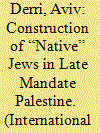

|
|
|
|
|
| Summary/Abstract |
This article concerns the place of late Ottoman Jews in Palestine on the eve of the 1948 War. It focuses on Israel Ben-Zeʾev (Wolfensohn), a Jerusalem-born educator and Nahda intellectual who led a movement of self-identified “native” Jews, including both “Old Yishuv” Ashkenazim and Sephardim, to combat their marginalization by the Zionist institutions. I examine his lifetime struggle to advance the study of Arabic and “Arab Jews” (yahud ʿarab) under early Islam by creating institutions of knowledge production and educational programs modeled on those he knew from his early academic career in Cairo. It was in the context of these struggles that demands for separate political representation for native Jews and for a specialized field of Arab Jewish studies coalesced as part of a broader project of a shared Arab-Jewish cultural modernization. They culminated in 1948, when Ben-Zeʾev finally realized his Arabic library project, ironically using looted Palestinian books, only to see its destruction four years later by Zionist leaders and Hebrew University professors.
|
|
|
|
|
|
|
|
|
|
|
|
|
|
|
|
| 9 |
ID:
058473
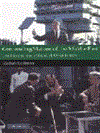

|
|
|
|
|
| Publication |
Cambridge, Cambridge University Press, 2004.
|
| Description |
xxi, 308p.pbk
|
| Series |
Contemporary Middle East; no.3
|
| Standard Number |
0521629373
|
|
|
|
|
|
|
|
|
|
|
|
Copies: C:1/I:0,R:0,Q:0
Circulation
| Accession# | Call# | Current Location | Status | Policy | Location |
| 049057 | 956.007201821/LOC 049057 | Main | On Shelf | General | |
|
|
|
|
| 10 |
ID:
169171
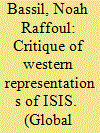

|
|
|
|
|
| Summary/Abstract |
The meteoric rise of the group calling itself the Islamic State of Iraq and al-Shams (ISIS) has been accompanied by an equally stunning effort to explain from where the organisation emerged, what it is, and why people have been attracted to it. What this article identities, is that despite what appears to be a veneer of intellectual heterogeneity, a deep Orientalism permeates knowledge production about ISIS. Adopting a hybrid-postcolonial lens, the analysis in this article demonstrates that due to a particular Eurocentric-Orientalist schema and disposition, ISIS and its horrendous crimes have been dehistoricised, depoliticised and decontextualised. Additionally, in the process ISIS has been reduced to the Muslim’s fundamentalist dispositions; its innate tendency to incorporate Islamic theological methods, medieval Islamic scholarship, Islamic culture into all forms of politics. Instead, we argue in conclusion, for ISIS to be understood there needs to be a re-reading of the emergence of Islamist violence and terror through a historicised, materialised and politicised methodological framework.
|
|
|
|
|
|
|
|
|
|
|
|
|
|
|
|
| 11 |
ID:
081599
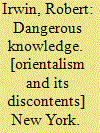

|
|
|
|
|
| Publication |
New York, Overlook Press, 2006.
|
| Description |
410p.
|
| Standard Number |
9781585678358
|
|
|
|
|
|
|
|
|
|
|
|
Copies: C:1/I:0,R:0,Q:0
Circulation
| Accession# | Call# | Current Location | Status | Policy | Location |
| 053293 | 303.48218105/IRW 053293 | Main | On Shelf | General | |
|
|
|
|
| 12 |
ID:
186547
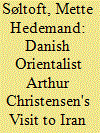

|
|
|
|
|
| Summary/Abstract |
This article focuses on Arthur Christensen's meeting with the Iranian intelligentsia in 1929. Arthur Christensen's L'Iran sous les Sassanides had a tremendous influence on the Iranian nationalism at the beginning of the twentieth century. However, Christensen's encounter with Iranian intellectuals in 1929 shows that from the very beginning they had much in common, and furthermore that Christensen was influenced by Iranian nationalism.
|
|
|
|
|
|
|
|
|
|
|
|
|
|
|
|
| 13 |
ID:
123610
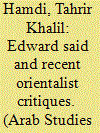

|
|
|
| 14 |
ID:
124923
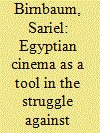

|
|
|
|
|
| Publication |
2013.
|
| Summary/Abstract |
The cinema has been used by Egyptian regimes, from the monarchy until Mubarak, to resist the political agenda of Islamic radicals and terrorists. Edward Said and others describe Islamic terrorists' images in the Western media as "Western fantasies." Nevertheless, for Egyptian intellectuals, terrorists were and remain a stark reality. In Egypt, the entire state apparatus was set in motion to fight Islamic terrorism. The state was unprepared for the massive popular uprising of 2011. While the direction that Egyptian culture will follow after Mubarak remains unclear, an important objective is to study pre-revolutionary Egyptian cinema and to understand its ideological tendencies.
|
|
|
|
|
|
|
|
|
|
|
|
|
|
|
|
| 15 |
ID:
123062
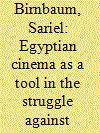

|
|
|
|
|
| Publication |
2013.
|
| Summary/Abstract |
The cinema has been used by Egyptian regimes, from the monarchy until Mubarak, to resist the political agenda of Islamic radicals and terrorists. Edward Said and others describe Islamic terrorists' images in the Western media as "Western fantasies." Nevertheless, for Egyptian intellectuals, terrorists were and remain a stark reality. In Egypt, the entire state apparatus was set in motion to fight Islamic terrorism. The state was unprepared for the massive popular uprising of 2011. While the direction that Egyptian culture will follow after Mubarak remains unclear, an important objective is to study pre-revolutionary Egyptian cinema and to understand its ideological tendencies.
|
|
|
|
|
|
|
|
|
|
|
|
|
|
|
|
| 16 |
ID:
126174
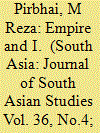

|
|
|
|
|
| Publication |
2013.
|
| Summary/Abstract |
Framed in a discussion of post-colonial approaches to the British Empire's influence on culture, a close reading of Captain Donald Campbell's late eighteenth-century travelogue contextualises the personal particularities in his assessments of Habsburg Europe, Ottoman West Asia and Mysorean/British South Asia. His is an imagination in which the bonds of 'religion' ameliorate the 'otherness' of continental Europeans, while his concept of 'enlightenment' learning is deployed to understand the Ottomans. Only in the case of South Asia is the very humanity of the 'other' denied. I argue that this landscape of otherness reflects the coincidence of the interests of his 'self' and the 'Empire', which overlap most thoroughly in South Asia. Campbell's travelogue is of value to post-colonial approaches, as it is a particularly poignant example of the manner in which the particularities of the 'self' contribute to the construction of broader cultural discourses permeated by 'Empire'.
|
|
|
|
|
|
|
|
|
|
|
|
|
|
|
|
| 17 |
ID:
125197
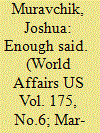

|
|
|
|
|
| Publication |
2013.
|
| Summary/Abstract |
Columbia University's English Department may seem a surprising place from which to move the world, but this is what Professor Edward Said accomplished. He not only transformed the West's perception of the Israel-Arab conflict, he also led the way toward a new, post-socialist life for leftism in which the proletariat was replaced by "people of color" as the redeemers of humankind. During the ten years that have passed since his death there have been no signs that his extraordinary influence is diminishing.
|
|
|
|
|
|
|
|
|
|
|
|
|
|
|
|
| 18 |
ID:
187740
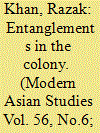

|
|
|
|
|
| Summary/Abstract |
This article examines often ignored ‘minority entanglements’ forged between European Jewish and South Asian Muslim intellectuals in Germany and traces their evolution in colonial India. The article focuses on three individual life histories and situates them within the more extensive Jewish-Muslim intellectual dialogue that resonated in the inter-war period. It brings to light the lives and writings of Josef Horovitz (1874–1931), professor of Arabic at the Muhammadan Anglo-Oriental College, Aligarh, and a prolific contributor to the journal Islamic Culture published in Hyderabad; Leopold Weiss alias Muhammad Asad (1900–1992) in Islamia College, Lahore, who also served as the editor of Islamic Culture, Hyderabad; and educationist and reform pedagogue Gerda Philipsborn (1895–1943) at the Jamia Millia Islamia, Delhi. The intellectual dialogue between minority communities, together with the contribution it made both to modern Islamic studies as a discipline and the forging of a new reform pedagogy, allow us to rethink the Jewish and Muslim question as well as the minority response to it through a comparative perspective. The minor history of European Jewish and South Asian Muslim entanglements makes for a rich testimony to the problems and possibilities of studying minorities as the makers of minor cosmopolitan knowledge.
|
|
|
|
|
|
|
|
|
|
|
|
|
|
|
|
| 19 |
ID:
080703
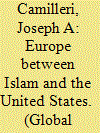

|
|
|
|
|
| Publication |
2008.
|
| Summary/Abstract |
Europe and its leaders, though they may not fully comprehend the significance of the events that are rapidly unfolding, and whether they like it or not, are key players in the historical process that will shape the geopolitics of the Middle East and Islam's response to the challenge of modernity. This is not say that Europe has it in its power to determine the choices that Iran and the Arab world will make, nor indeed should it attempt to do so. On the other hand, it does have a margin of manoeuvre which, depending on the way it is exercised, may tilt the balance in favour either of the politics of coexistence and cooperation or the politics of confrontation. European choices and capacities will revolve around four questions: How will European policies and attitudes position themselves vis- -vis the Orientalist tendencies of the past? What steps might be taken to clear the backlog of unresolved geopolitical tensions and misunderstandings? Can Europe develop a programmatic approach to regional and international governance which accepts cultural plurality as its foundation stone, even if this should create tensions in the transatlantic relationship? Is Europe disposed to forge a new social compact that accepts Muslims in Europe as European citizens fully engaged in the task of European construction? The article argues that these are not four unrelated questions, each with its own separate logic and modus operandi, but four mutually constitutive policydilemmas that will in large measure reflect and in part shape European efforts to fashion a new identityand sense of place in the world
|
|
|
|
|
|
|
|
|
|
|
|
|
|
|
|
| 20 |
ID:
101828
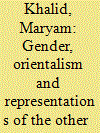

|
|
|
|
|
| Publication |
2011.
|
| Summary/Abstract |
After 9/11, images of the Middle Eastern or Muslim 'Other' have been highly visible in the Western world. Although published 30 years ago, Edward Said's Orientalism provides a useful critical lens through which to examine how these images function in War on Terror discourses. Feminist IR scholars have also highlighted the role gendered representations play in War on Terror discourse, and 'orientalism' as a tool of critical analysis must account for this. Using a concept of 'gendered orientalism' and applying it to three particularly prominent images from the War on Terror, I illustrate how gendered and orientalist logics in official and unofficial War on Terror discourses construct masculinities and femininities according to race, manipulating and deploying representations of the 'Other' to justify military involvement in Afghanistan and Iraq.
|
|
|
|
|
|
|
|
|
|
|
|
|
|
|
|
|
|
|
|
|